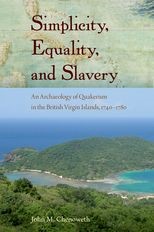Simplicity, Equality, and Slavery: An Archaeology of Quakerism in the British Virgin Islands, 1740-1780
Simplicity, Equality, and Slavery: An Archaeology of Quakerism in the British Virgin Islands, 1740-1780
Cite
Abstract
How do both a religious community and a religion change when their members must face contradictions between their ideals and the society in which they live? This question is answered here by using archaeological and archival information to trace the life of a group of Quakers (members of the Religious Society of Friends) residing in the British Virgin Islands between 1741 and 1763. A group of mostly poor, white planters formed this unique community inspired by the ideals of equality, simplicity, and peace. However, these ideals were enacted in a slave society, with all or nearly all the members holding enslaved people themselves, attempting to improve their lot through the violent appropriation of labor from others on plantations. Combining archival and archaeological evidence, the book shows how modern expectations of “Quakerly” behavior are not met in this community. Instead, we find Quakerism being negotiated in creative ways that fit within a slavery-based economy and society: through foods, relationships with other planters and the enslaved people themselves, and social advancement. Community is often conceived as something every member shares equally, but the historical archaeology approach and anthropological analysis of this volume shows how social groups like religions are full of conflicting perspectives and goals—in this case, conflicts which led to the group’s end after one generation. By examining how one small group interpreted Quakerism’s ideals in the contrasting environment of the eighteenth-century Caribbean, we learn what a religion is and how it matters in the daily lives of its members.
-
Front Matter
-
1
Introduction: “In the Bowels of Our Lord”
-
2
Contexts: The History and Archaeology of the British Virgin Islands and Their Meeting
-
3
“Two Plantations” on the Plantation: Simplicity, Wealth, and Status
-
4
“Furnished with Convenience for a Meeting House”: Simplicity and Meetinghouses
-
5
Peace and Weaponry on BVI Quaker Sites
-
6
Discipline, Community, and Conformity
-
7
Equality, Race, and Slavery in BVI Communities
-
8
Reconsidering Simplicity, Equality, Peace, and the End of the Meeting
-
End Matter
Sign in
Personal account
- Sign in with email/username & password
- Get email alerts
- Save searches
- Purchase content
- Activate your purchase/trial code
Institutional access
-
Sign in through your institution
- Sign in with a library card Sign in with username/password Recommend to your librarian
Institutional account management
Sign in as administratorPurchase
Our books are available by subscription or purchase to libraries and institutions.
Purchasing information| Month: | Total Views: |
|---|---|
| October 2022 | 1 |
| October 2022 | 1 |
| October 2022 | 1 |
| November 2022 | 1 |
| December 2022 | 1 |
| January 2023 | 1 |
| January 2023 | 2 |
| January 2023 | 3 |
| June 2023 | 1 |
| June 2023 | 2 |
| June 2023 | 1 |
| June 2023 | 3 |
| October 2023 | 1 |
| October 2023 | 1 |
| October 2023 | 1 |
| October 2023 | 3 |
| October 2023 | 1 |
| December 2023 | 1 |



Get help with access
Institutional access
Access to content on Oxford Academic is often provided through institutional subscriptions and purchases. If you are a member of an institution with an active account, you may be able to access content in one of the following ways:
IP based access
Typically, access is provided across an institutional network to a range of IP addresses. This authentication occurs automatically, and it is not possible to sign out of an IP authenticated account.
Sign in through your institution
Choose this option to get remote access when outside your institution. Shibboleth/Open Athens technology is used to provide single sign-on between your institution’s website and Oxford Academic.
If your institution is not listed or you cannot sign in to your institution’s website, please contact your librarian or administrator.
Sign in with a library card
Enter your library card number to sign in. If you cannot sign in, please contact your librarian.
Society Members
Society member access to a journal is achieved in one of the following ways:
Sign in through society site
Many societies offer single sign-on between the society website and Oxford Academic. If you see ‘Sign in through society site’ in the sign in pane within a journal:
If you do not have a society account or have forgotten your username or password, please contact your society.
Sign in using a personal account
Some societies use Oxford Academic personal accounts to provide access to their members. See below.
Personal account
A personal account can be used to get email alerts, save searches, purchase content, and activate subscriptions.
Some societies use Oxford Academic personal accounts to provide access to their members.
Viewing your signed in accounts
Click the account icon in the top right to:
Signed in but can't access content
Oxford Academic is home to a wide variety of products. The institutional subscription may not cover the content that you are trying to access. If you believe you should have access to that content, please contact your librarian.
Institutional account management
For librarians and administrators, your personal account also provides access to institutional account management. Here you will find options to view and activate subscriptions, manage institutional settings and access options, access usage statistics, and more.